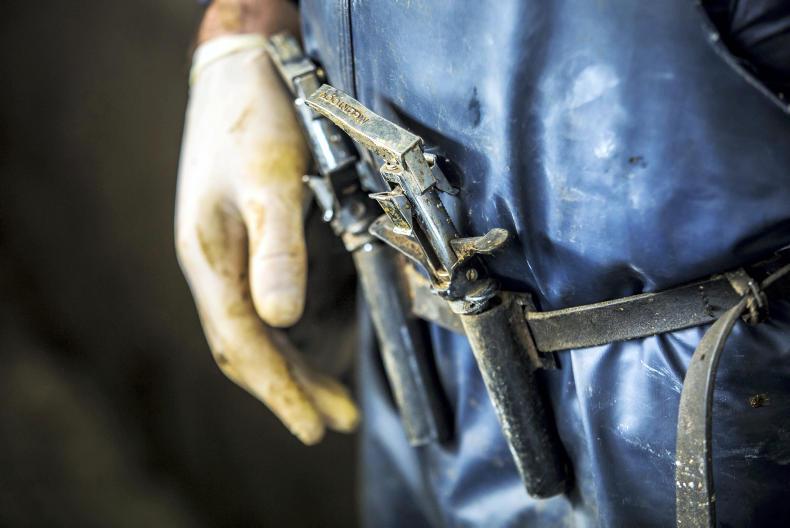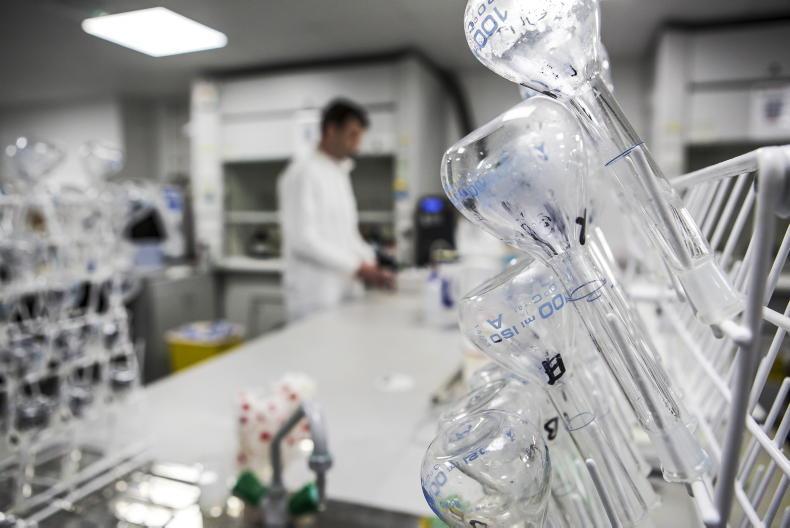Farmers in NI will not be forced to TB-test cattle, and will not be hit with financial penalties or restrictions on slaughtering if tests are delayed due to coronavirus.
A farmer must self-isolate if they or someone in their household displays symptoms of coronavirus, such as a high temperature or a persistent cough. Also, some farmers may need to self-isolate due to age or long-term health issues, regardless of symptoms.
After intensive lobbying by the UFU, new guidance published by DAERA this week states if a TB test is scheduled for the self-isolation period and no one else is available to present the cattle for testing, the farmer should contact their vet to get the test re-arranged.
“All vets must consider if social distancing (of 2m) can be maintained at tests, and if it cannot, the test should not be undertaken,” the guidance also reads.
No cross-compliance penalties will be imposed if a re-arranged test falls outside the farmer’s testing window.
Movement restrictions will continue to apply to herds that have overdue TB tests, although farmers should “disregard notices” about restrictions on slaughtering cattle (in normal circumstances, if a test is overdue by more than a month, all movements are stopped, including to slaughter).
DAERA chief vet Robert Huey told Stormont’s agriculture committee last week that he intends to keep the TB testing programme going in NI for the foreseeable future.
However, he acknowledged that amid the coronavirus pandemic, TB testing presents a health risk for both farmers and vets.
“We have to keep looking at that risk. At the moment, I think it is acceptable,” Huey told MLAs.
He pointed to the foot and mouth epidemic of 2001 when TB testing was suspended for a six-month period. When it recommenced, herd incidence rates in NI steadily increased from below 7% to over 10% by early 2003.
“We know from 2001 and the Foot and Mouth crisis that if you stop TB testing, the results can be devastating,” Huey said.
DAERA priorities
The chief vet also told MLAs that his top priority during the coronavirus pandemic is to keep food moving off-farm and through the supply chain. This involves making sure DAERA vets are present in abattoirs for meat inspection, and available for certification of animal-based food products.
“The one that worries me the most, as far as animal welfare is concerned, is the intensive sectors, both poultry and pigs,” Huey said.
He pointed to broiler production where birds quickly become overweight if they are kept on farms too long. This leads to issues with welfare, processing and marketing.
“It’s the same in the pig industry. It’s a conveyor belt and it has to be kept moving,” Huey said.
Senior DAERA officials are now looking at how to allocate staff to keep essential services operational.
“We anticipate that upwards of 25% of staff could be away from work at the peak of the outbreak, even as a direct or indirect result of COVID-19,” Brian Doherty from DAERA told MLAs.
UFU reacts to TB announcement
After being inundated by calls from farmers concerned about the risk of COVID-19 transmission during TB testing, UFU deputy president David Brown highlighted that there are also members who want tests done.
“There are numerous UFU members who want to test livestock to clear the disease from their herds and have the test scheduled because they want it done before summer grazing. Enabling TB testing to continue where farmers are supportive of it, will help to maintain the integrity of the food chain” he said.
Read more
Editorial: farmers cannot be left behind during coronavirus crisis
Coronavirus shutdown: what shops will be open for farmers?
Farmers in NI will not be forced to TB-test cattle, and will not be hit with financial penalties or restrictions on slaughtering if tests are delayed due to coronavirus.
A farmer must self-isolate if they or someone in their household displays symptoms of coronavirus, such as a high temperature or a persistent cough. Also, some farmers may need to self-isolate due to age or long-term health issues, regardless of symptoms.
After intensive lobbying by the UFU, new guidance published by DAERA this week states if a TB test is scheduled for the self-isolation period and no one else is available to present the cattle for testing, the farmer should contact their vet to get the test re-arranged.
“All vets must consider if social distancing (of 2m) can be maintained at tests, and if it cannot, the test should not be undertaken,” the guidance also reads.
No cross-compliance penalties will be imposed if a re-arranged test falls outside the farmer’s testing window.
Movement restrictions will continue to apply to herds that have overdue TB tests, although farmers should “disregard notices” about restrictions on slaughtering cattle (in normal circumstances, if a test is overdue by more than a month, all movements are stopped, including to slaughter).
DAERA chief vet Robert Huey told Stormont’s agriculture committee last week that he intends to keep the TB testing programme going in NI for the foreseeable future.
However, he acknowledged that amid the coronavirus pandemic, TB testing presents a health risk for both farmers and vets.
“We have to keep looking at that risk. At the moment, I think it is acceptable,” Huey told MLAs.
He pointed to the foot and mouth epidemic of 2001 when TB testing was suspended for a six-month period. When it recommenced, herd incidence rates in NI steadily increased from below 7% to over 10% by early 2003.
“We know from 2001 and the Foot and Mouth crisis that if you stop TB testing, the results can be devastating,” Huey said.
DAERA priorities
The chief vet also told MLAs that his top priority during the coronavirus pandemic is to keep food moving off-farm and through the supply chain. This involves making sure DAERA vets are present in abattoirs for meat inspection, and available for certification of animal-based food products.
“The one that worries me the most, as far as animal welfare is concerned, is the intensive sectors, both poultry and pigs,” Huey said.
He pointed to broiler production where birds quickly become overweight if they are kept on farms too long. This leads to issues with welfare, processing and marketing.
“It’s the same in the pig industry. It’s a conveyor belt and it has to be kept moving,” Huey said.
Senior DAERA officials are now looking at how to allocate staff to keep essential services operational.
“We anticipate that upwards of 25% of staff could be away from work at the peak of the outbreak, even as a direct or indirect result of COVID-19,” Brian Doherty from DAERA told MLAs.
UFU reacts to TB announcement
After being inundated by calls from farmers concerned about the risk of COVID-19 transmission during TB testing, UFU deputy president David Brown highlighted that there are also members who want tests done.
“There are numerous UFU members who want to test livestock to clear the disease from their herds and have the test scheduled because they want it done before summer grazing. Enabling TB testing to continue where farmers are supportive of it, will help to maintain the integrity of the food chain” he said.
Read more
Editorial: farmers cannot be left behind during coronavirus crisis
Coronavirus shutdown: what shops will be open for farmers?









SHARING OPTIONS